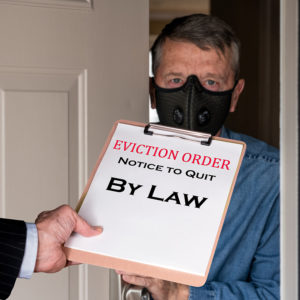Just as we usually have advance warning before a hurricane strikes, the nation has been warned for months about an alarming flood of evictions on the horizon.
Ever since the spike in unemployment due to COVID-19, it has been clear that millions of people would be unable to pay their rent when the $600 weekly supplemental unemployment payments under the CARES Act end on July 31 —and the temporary moratoriums on evictions lift.
The situation threatens both tenants and landlords. An analysis of the U.S. Census Household Pulse Survey indicates that more than 11 million evictions may be filed between August and November as moratoriums are lifted.
At the same time, without rent payments and mortgage assistance, many small property owners will be forced to leave the housing market, further depleting the United States’ affordable housing supply.
Without immediate action, a tidal surge of evictions is likely to leave in its wake a significant increase in homelessness nationally that could overwhelm state and local governments and strain their precious COVID-19 response resources.
As with hurricanes, there are preparations and actions that can — and should — be taken to mitigate the effect of the storm of evictions and protect likely victims.
Help will be needed in three different but overlapping areas: robust federal intervention, including funding for legal aid offices nationwide; a big increase in volunteering by lawyers in every state; and innovative solutions — leveraging new and existing technology — to allow increased access to justice.
Specifically:
— The CARES Act gave the Legal Services Corporation — which funds legal aid offices serving every congressional district — $50 million of the $100 million it requested in emergency funding to address increased legal needs caused by COVID-19.
Because tenants facing eviction frequently cannot afford an attorney to help them understand their rights during the process and other low-income Americans facing increasing legal issues need help too, LSC continues to ask for the additional $50 million, which the House of Representatives has included in the proposed HEROES Act. The ABA supports this request and calls on the Senate to include it in its next COVID-19 relief bill, too.
— The ABA also strongly supports the Senate’s Eviction Crisis Act, which would provide resources for the establishment of community housing courts. Such specialty courts can move expeditiously on some cases and the presiding judge is usually an expert in the field.
Paired with legal support, these courts can prevent unnecessary evictions and make legal or social services assistance available to help tenants pay debts or to transition to a new, stable home environment, reducing the likelihood of homelessness.
— The ABA also supports housing proposals that fund safeguards for vulnerable populations in public housing, including the elderly, those with disabilities and families with children. We also support proposals to fund emergency homeless assistance and prevention programs and increase the availability of affordable housing.
— Additionally, the ABA supports guidelines for judges to use in cases with unrepresented litigants in housing court, which include providing a clear explanation of the process and ensuring the litigant understands the issues involved in the trial, addressing language barriers and providing trial preparation materials.
But those efforts alone won’t be enough.
This impending crisis also requires many more of our nation’s lawyers to represent tenants in eviction proceedings on a pro bono basis and to think innovatively about how to address the larger problem of access to justice. This is a call to action.
Technology is part of the solution. One successful program is ABA Free Legal Answers, a website where qualifying individuals facing legal problems, including evictions, can submit questions and receive answers from pro bono lawyers in 44 states.
Thousands of lawyers have volunteered and answered more than 115,000 questions to help fill a gap for people in crisis. Even so, more lawyers are needed to meet the huge demand for legal help.
In addition to state and local pro bono programs that began with COVID-19, the ABA’s continuing pro bono program is focused on the fallout from the pandemic nationwide and encourages lawyers to volunteer to help solve COVID-19-related legal, including evictions.
Just as the coronavirus is spurring innovation in health care and teleworking, so can it encourage lawyers, judges and law schools to find creative solutions to improve justice for landlords and tenants.
Early in the crisis, the ABA formed a national task force of leading lawyers, judges and technologists to identify the public’s legal needs arising from the pandemic, recommend solutions and help mobilize volunteer lawyers and legal professionals to assist people who need help.
For example, some legal tech companies and legal nonprofits are creating document automation and smart systems to help identify tenant-landlord legal issues or create documents that can help tenants request rent relief from their landlords.
Before the eviction hurricane hits, let’s do everything we can to limit the damage.
The clock is ticking.

